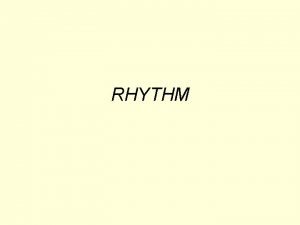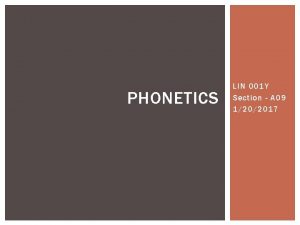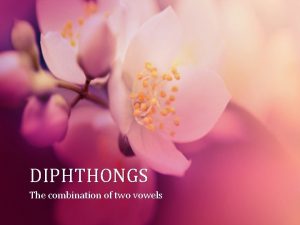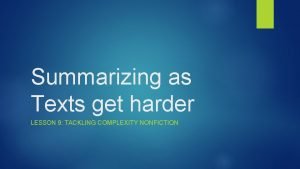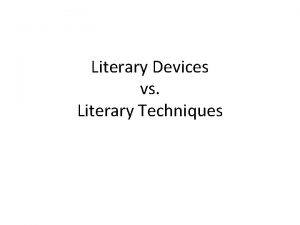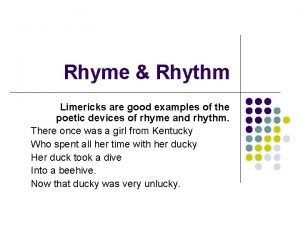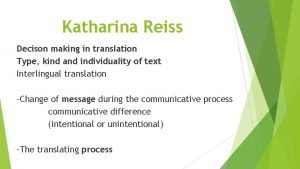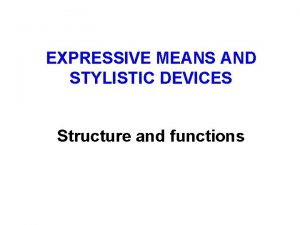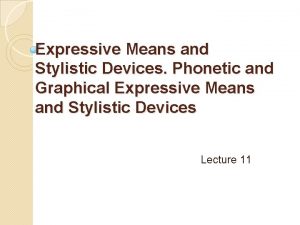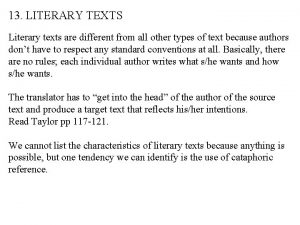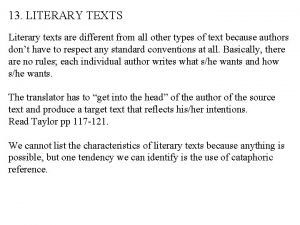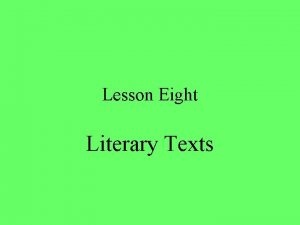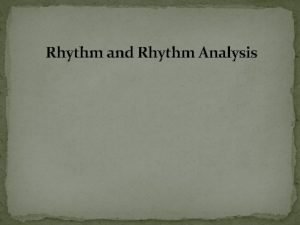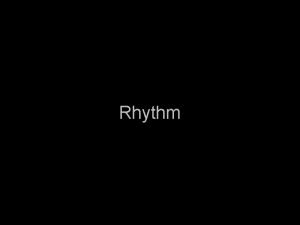RHYTHM Literary texts expressive texts Sounds and rhythm











- Slides: 11

RHYTHM

Literary texts = expressive texts

Sounds and rhythm = examples of stylistic variation • Rhythm in narrative prose = melody • Melodic unit: sequence of syllables • Beginning and end of a melodic unit: punctuation marks (usually but not necessarily)

Punctuation and melodic units • Grammatical use of punctuation vs psychological use of punctuation • Relevance of the melodic units in an expressive text.

• Question: is it fair to alter the melody of a narrative passage? • Example: Emma (Jane Austen)

Original text Emma could not bear to give him pain. He was wishing to confide in her – perhaps to consult her; cost her what it would, she would listen. She might assist his resolution, or reconcile him to it; she might give just praise to Harriet, or, by representing to him his own independence, relieve him from that state of indecision which must be more intolerable than any alternative to such a mind as his. They had reached the house.

The weather continued much the same all the following morning; and the same loneliness, and the same melancholy, seemed to reign at Hartfield; but in the afternoon it cleared; the wind changed into a softer quarter; the clouds were carried off; the sun appeared; it was summer again. 16// 6/7/6/8/10/6/4/6// With all the eagerness which such a transition gives, Emma resolved to be out of doors as soon as possible. 13/14

Never had the exquisite sight, smell, sensation of nature, tranquil, warm, and brilliant after a storm, been more attractive to her. 8/1/6/2/1/7/7// She longed for the serenity they might gradually introduce; and on Mr Perry’s coming in soon after dinner, with a disengaged hour to give her father, she lost no time in hurrying into the shrubbery. 15/14/11/12//

The melodic units in the ST and in two target texts (language: Italian) • ST 9/9, 6, 5, 3/9, 7, 8, 1, 13, 32/5 • TT 1 16/14, 7, 11, 9/16, 10, 19, 1, 17, 14, 30/12 • TT 2 18/16, 9, 7, 8/13, 9, 16, 13, 23, 9, 9/9

Emma non poteva tollerare di addolorarlo. Egli desiderava di confidarsi con lei – forse di consultarla – qualunque cosa dovesse costarle, essa doveva ascoltare. Avrebbe potuto confortare la sua decisione, o fare che ci si rassegnasse; avrebbe potuto tributare le debite lodi a Harriet, o, argomentando in favore della sua indipendenza, sollevarlo da quello stato d’indecisione, che doveva essere più intollerabile d’ogni alternativa a una mente come la sua. Frattanto erano giunti alla casa. 9//9/6/5/3//9/7/8/1/13/32//5 16//14/7/11/9//16/10/19/1/17/14/30//12

Ma Emma non poteva tollerare di recargli dolore. Poiché Mr Knightley desiderava confidarsi a lei. . . e forse chiederle consiglio, l’avrebbe ascoltato, costasse quel che costasse. Poteva confortarlo nella decisione, o riconciliarlo con essa: poteva rendere a Harriet l’omaggio dovuto o, richiamandolo alla sua indipendenza, liberarlo da uno stato d’indecisione certo più intollerabile, per una mente come la sua, di qualunque alternativa. Erano davanti a casa: 9//9/6/5/3//9/7/8/1/13/32//5 18//16/9/7/8//13/9/16/13/23/9/9//9
 Expressive text
Expressive text Oral sounds and nasal sounds
Oral sounds and nasal sounds Diphthongs sounds are the combination of two vowel sounds
Diphthongs sounds are the combination of two vowel sounds Lesson 9 summarizing literary texts answers
Lesson 9 summarizing literary texts answers What is literary devices
What is literary devices Rhythm & rhyme
Rhythm & rhyme Informative expressive operative
Informative expressive operative Meaning of lexical
Meaning of lexical Syntactical expressive means and stylistic devices
Syntactical expressive means and stylistic devices Katharina reiss text types
Katharina reiss text types Function of stylistic devices
Function of stylistic devices Expressive means examples
Expressive means examples
